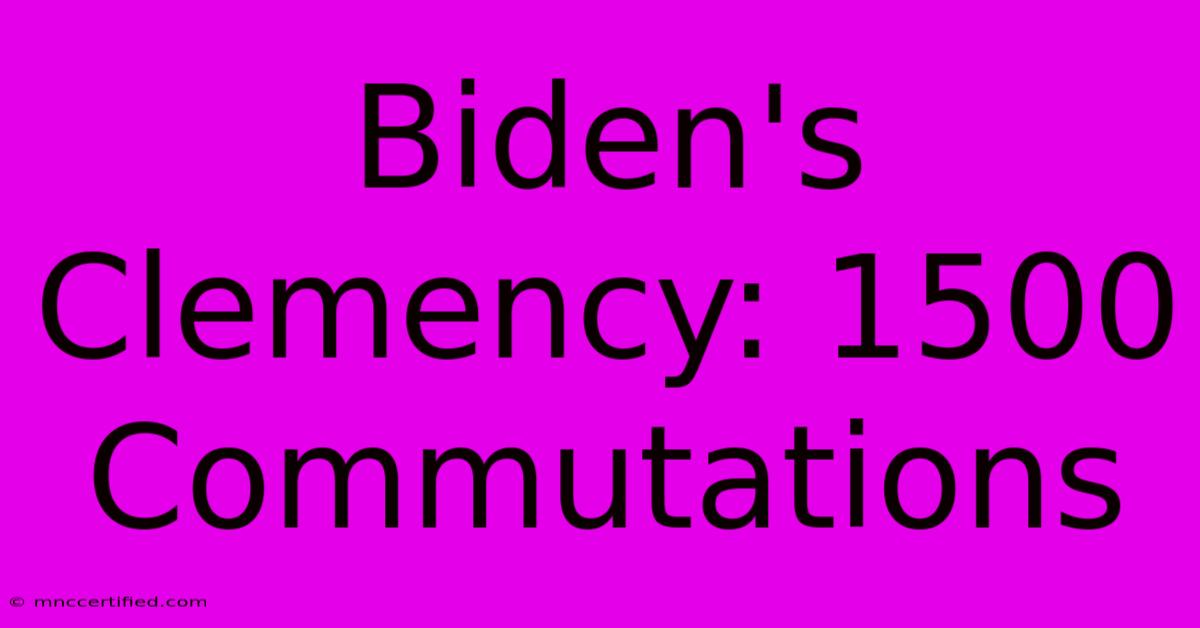Biden's Clemency: 1500 Commutations

Table of Contents
Biden's Clemency: 1500 Commutations and the Future of Criminal Justice Reform
President Biden's administration has made a significant mark on criminal justice reform through a substantial clemency initiative, granting over 1500 commutations. This unprecedented move has sparked considerable debate, raising questions about its impact, effectiveness, and the future direction of such policies. This article delves into the details of Biden's clemency efforts, analyzing their significance and exploring the broader implications for criminal justice reform in the United States.
Understanding Presidential Clemency: Pardons vs. Commutations
Before examining Biden's actions, it's crucial to understand the distinction between a pardon and a commutation. A pardon completely wipes out a conviction, restoring all rights and privileges lost due to the crime. A commutation, on the other hand, reduces a sentence, often changing a prison sentence to probation or time served. Biden's actions primarily focused on commutations, targeting individuals convicted of non-violent drug offenses.
The Scope of Biden's Commutations: 1500+ and Counting
The sheer scale of Biden's clemency initiative is noteworthy. Granting over 1500 commutations represents a substantial effort to address the legacy of harsh drug sentencing policies. These commutations disproportionately benefited individuals from marginalized communities, aligning with the administration's focus on addressing systemic inequalities within the justice system. This is a significant departure from previous administrations, highlighting a renewed commitment to criminal justice reform.
Key Characteristics of the Commuted Sentences:
- Non-violent drug offenses: The majority of commutations involved individuals convicted of non-violent drug offenses, reflecting a growing national consensus that lengthy sentences for these crimes are often counterproductive.
- Focus on rehabilitation: The selection criteria prioritized individuals who demonstrated a commitment to rehabilitation, such as participation in educational programs or drug treatment during their incarceration.
- Addressing disparities: The initiative sought to address racial and ethnic disparities within the justice system, with a focus on granting clemency to individuals from underserved communities.
The Impact and Significance of Biden's Clemency
The long-term effects of Biden's clemency initiative are still unfolding, but several immediate impacts are evident:
- Reduced prison populations: Commutations directly contribute to lowering prison populations, reducing the strain on the justice system and potentially saving taxpayer money.
- Second chances for individuals: Commutations offer individuals a chance to reintegrate into society, access employment, and rebuild their lives.
- Policy change catalyst: The initiative serves as a powerful symbol of change, potentially influencing future sentencing practices and shaping the broader debate on criminal justice reform.
Challenges and Criticisms
Despite its considerable positive aspects, Biden's clemency initiative has faced criticism:
- Selection process transparency: Some critics argue for greater transparency in the selection process to ensure fairness and equity.
- Resource allocation: Providing adequate resources for re-entry programs is essential to support individuals who receive commutations.
- Addressing the root causes of crime: Clemency is only one aspect of addressing crime; broader societal issues, like poverty and lack of opportunity, also need addressing.
The Future of Clemency and Criminal Justice Reform
Biden's clemency initiative represents a significant step towards criminal justice reform. However, the work is far from over. Future policy directions should consider:
- Sentencing reform: Addressing excessively long sentences for non-violent offenses at the legislative level.
- Investment in rehabilitation: Increased investment in rehabilitation programs to support successful reintegration into society.
- Addressing systemic inequalities: Continuing efforts to address racial and ethnic disparities in the justice system.
By continuing to examine and improve upon these initiatives, the US can move toward a more just and equitable criminal justice system. The legacy of Biden's 1500+ commutations will likely be debated for years to come, but its undeniable impact on the lives of thousands of individuals and the future direction of criminal justice policy in the United States is undeniable.

Thank you for visiting our website wich cover about Biden's Clemency: 1500 Commutations. We hope the information provided has been useful to you. Feel free to contact us if you have any questions or need further assistance. See you next time and dont miss to bookmark.
Featured Posts
-
18 Year Old Gukesh Youngest World Champion
Dec 13, 2024
-
Illinois Man Pleads Not Guilty To Assault
Dec 13, 2024
-
Voice Of America Trump Selects Lake
Dec 13, 2024
-
Hojlund Offers Amorim Hope As Man United Falters
Dec 13, 2024
-
Gukesh Dommaraju Indias Chess Champion
Dec 13, 2024